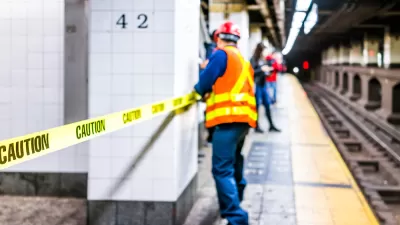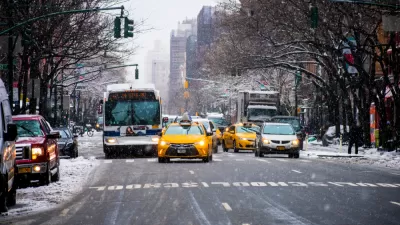A series of federal relief funding in 2020 and 2021 helped the New York MTA keep its head above water over the past three years, but the funding is running out and the books still have to be balanced for a post-pandemic world.

The New York Metropolitan Transportation Authority (MTA) took initial steps toward addressing its ongoing fiscal crisis—a persistent theme since the outset of the pandemic that has taken on new urgency without any large-scale relief packages, such as the Covid Relief Act of 2020, on the horizon. According to an article by Steve Bittenbender for the Center Square, the MTA is facing a $11.4 billion shortfall over the next four years.
“With just $5.65 billion in federal COVID-19 relief funding remaining, and ridership still lagging from pre-pandemic levels, the state agency that oversees mass transit in the New York City area is looking at a mix of cost saving measures and additional revenue streams to tackle the shortfalls it expects through the 2026 fiscal year,” reports Bittenbender. The MTA’s budget plan was made public during a presentation to the board at the end of November.
The MTA will still need help to balance the books, however. “Part of that plan is the assumption of $600 million more in government aid to help cover the shortfall for the 2023 fiscal year,” reports Bittenbender.
As reported by Jose Martinez for The City, riders might end up covering some of the budget deficit as well. “On the subways and buses, that could mean a $2.90 fare in 2023 and one that hits $3.05 by 2025,” according to Martinez. The MTA last raised fares in April 2019.
FULL STORY: New York transit to address $11.4 billion budget deficit

Planetizen Federal Action Tracker
A weekly monitor of how Trump’s orders and actions are impacting planners and planning in America.

Maui's Vacation Rental Debate Turns Ugly
Verbal attacks, misinformation campaigns and fistfights plague a high-stakes debate to convert thousands of vacation rentals into long-term housing.

San Francisco Suspends Traffic Calming Amidst Record Deaths
Citing “a challenging fiscal landscape,” the city will cease the program on the heels of 42 traffic deaths, including 24 pedestrians.

Defunct Pittsburgh Power Plant to Become Residential Tower
A decommissioned steam heat plant will be redeveloped into almost 100 affordable housing units.

Trump Prompts Restructuring of Transportation Research Board in “Unprecedented Overreach”
The TRB has eliminated more than half of its committees including those focused on climate, equity, and cities.

Amtrak Rolls Out New Orleans to Alabama “Mardi Gras” Train
The new service will operate morning and evening departures between Mobile and New Orleans.
Urban Design for Planners 1: Software Tools
This six-course series explores essential urban design concepts using open source software and equips planners with the tools they need to participate fully in the urban design process.
Planning for Universal Design
Learn the tools for implementing Universal Design in planning regulations.
Heyer Gruel & Associates PA
JM Goldson LLC
Custer County Colorado
City of Camden Redevelopment Agency
City of Astoria
Transportation Research & Education Center (TREC) at Portland State University
Jefferson Parish Government
Camden Redevelopment Agency
City of Claremont





























